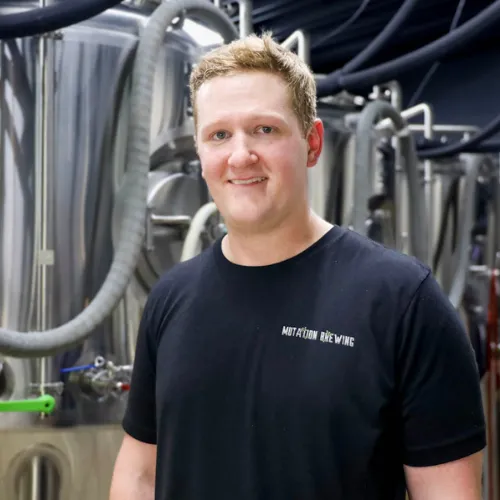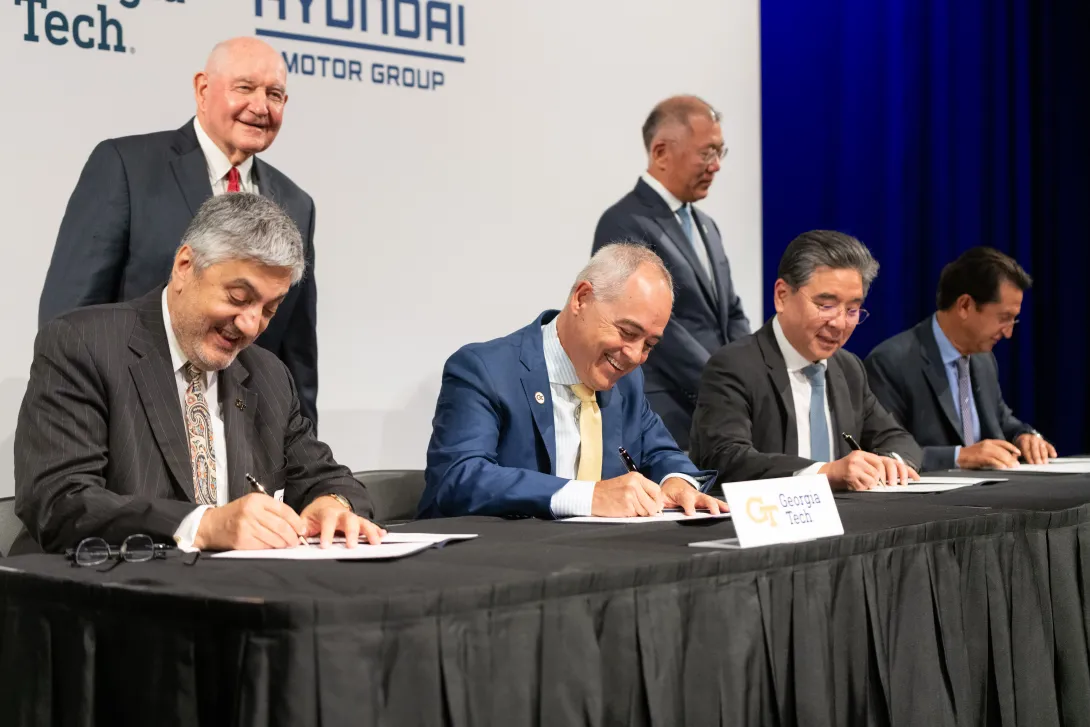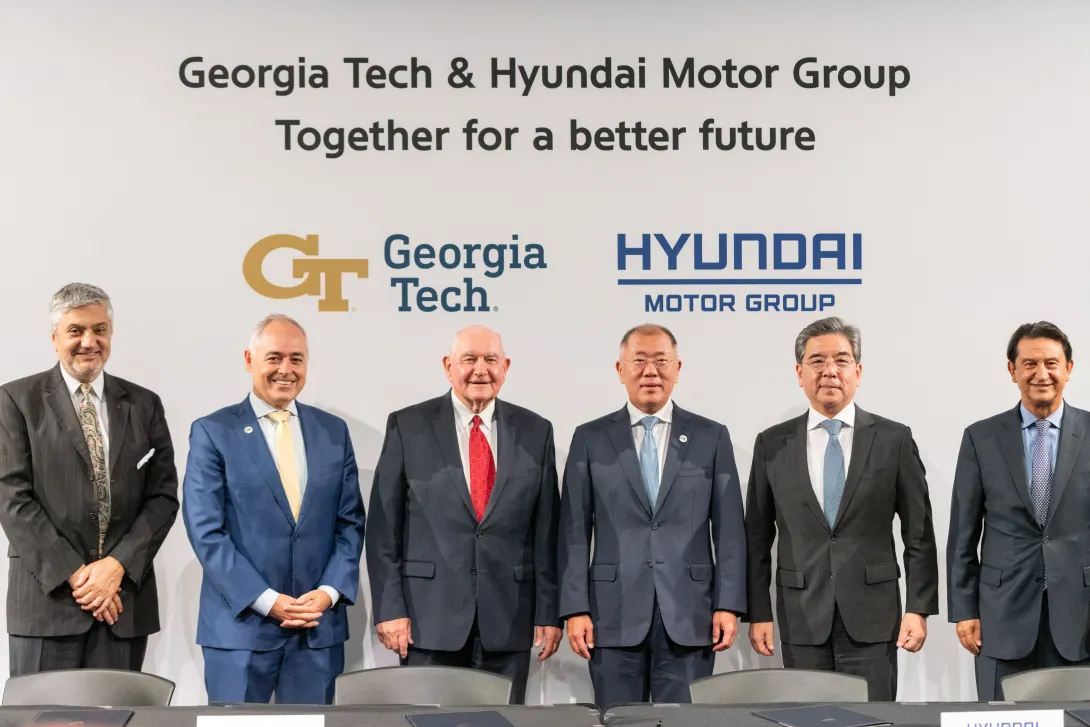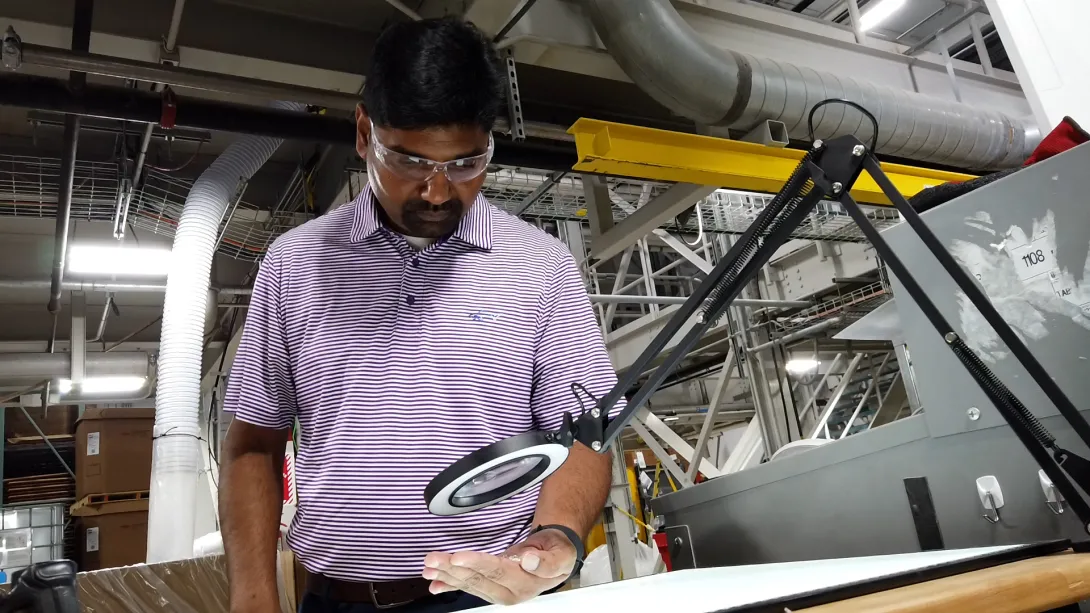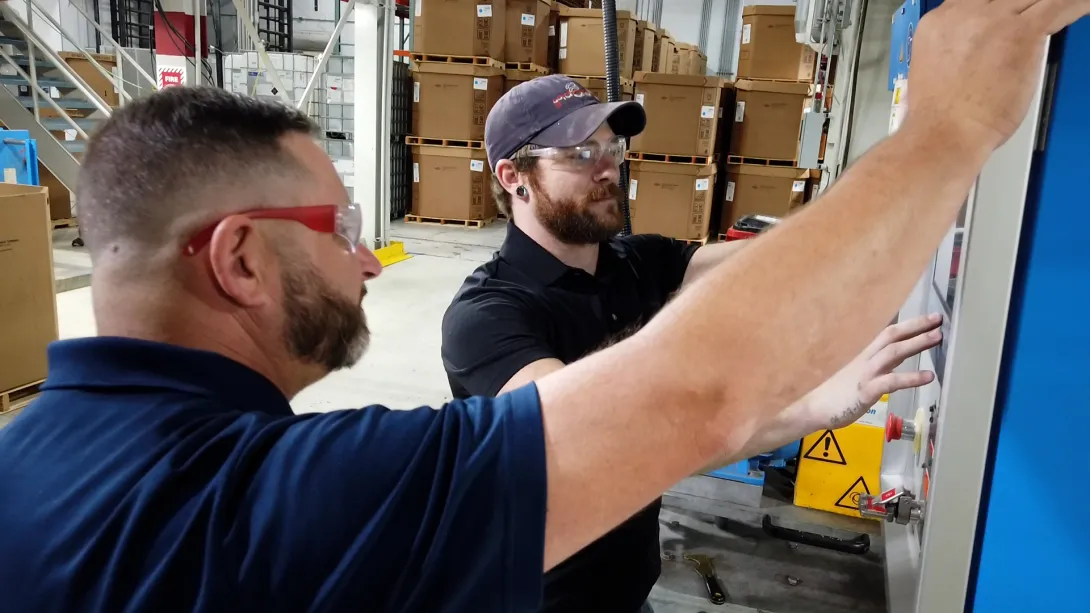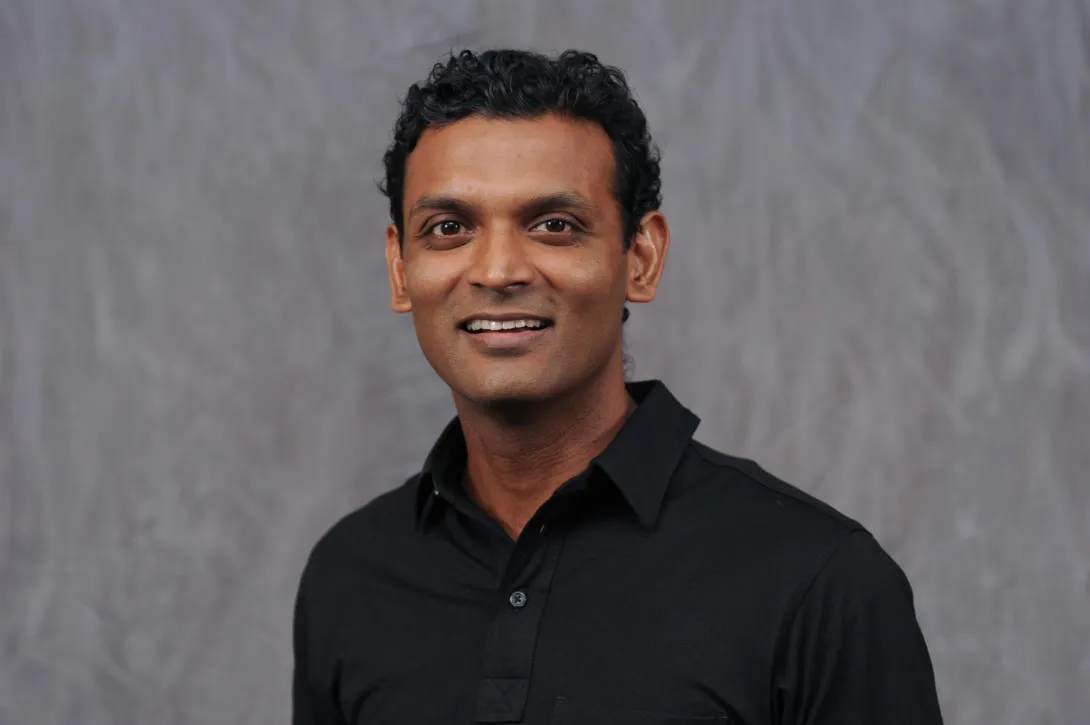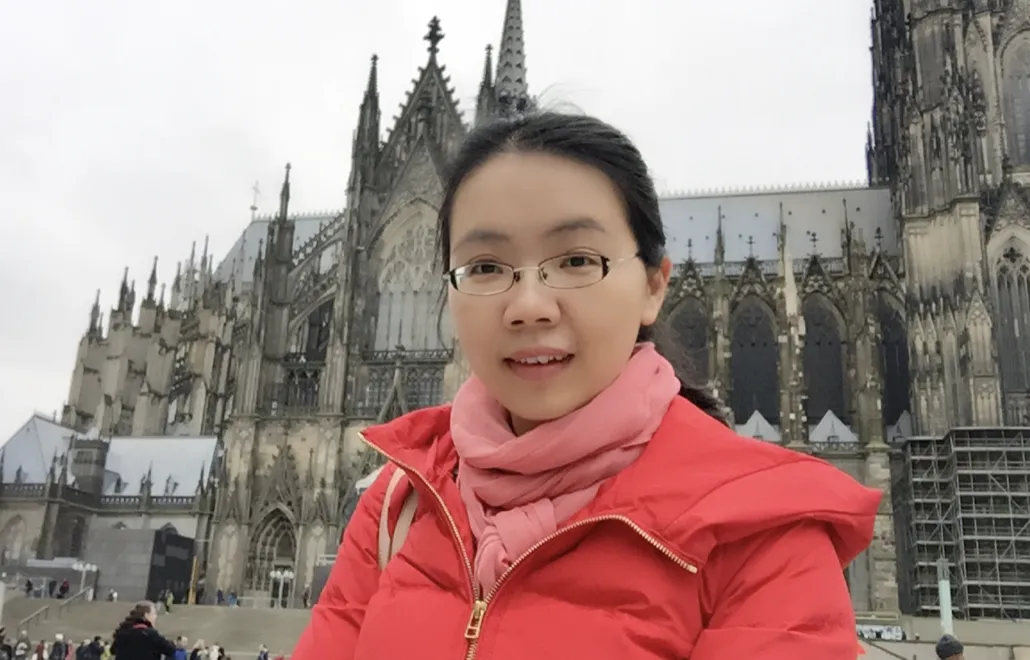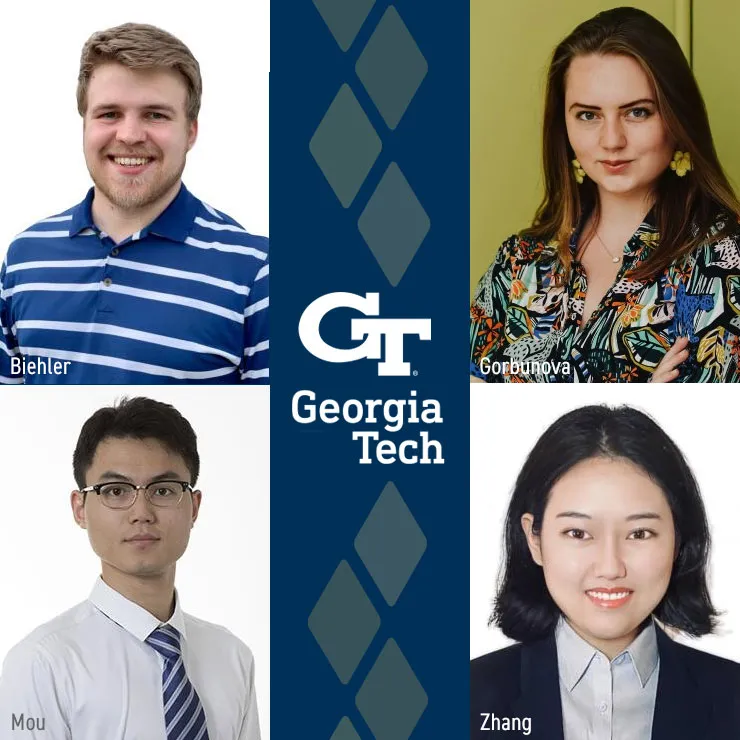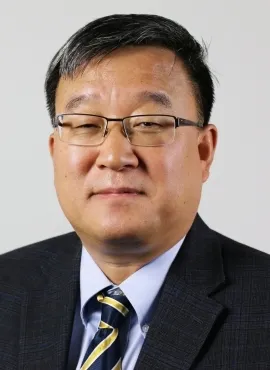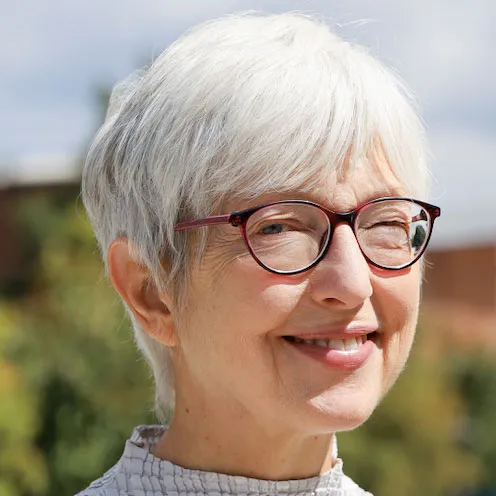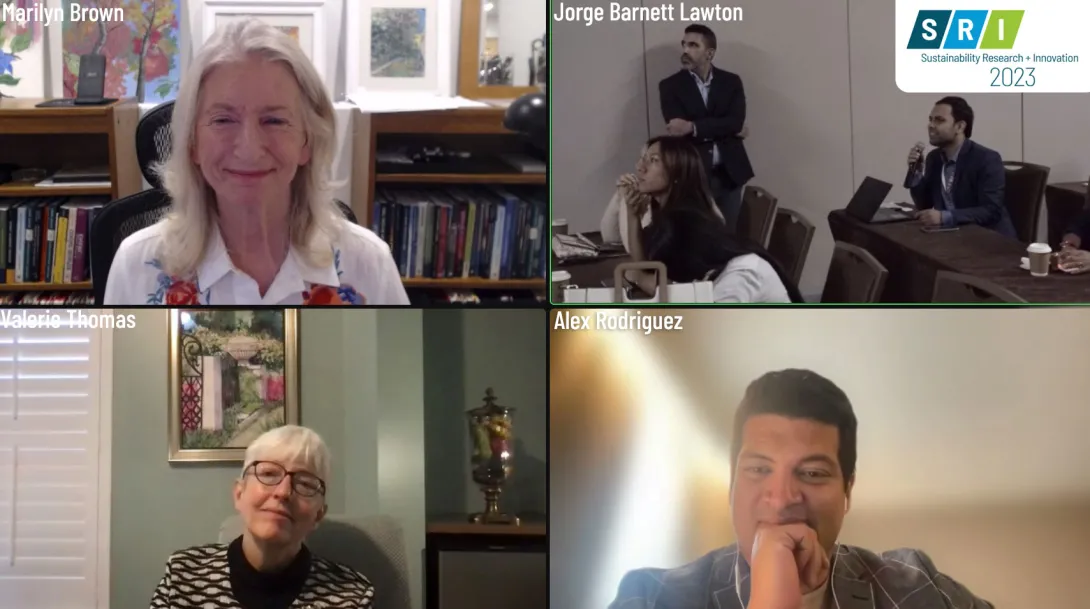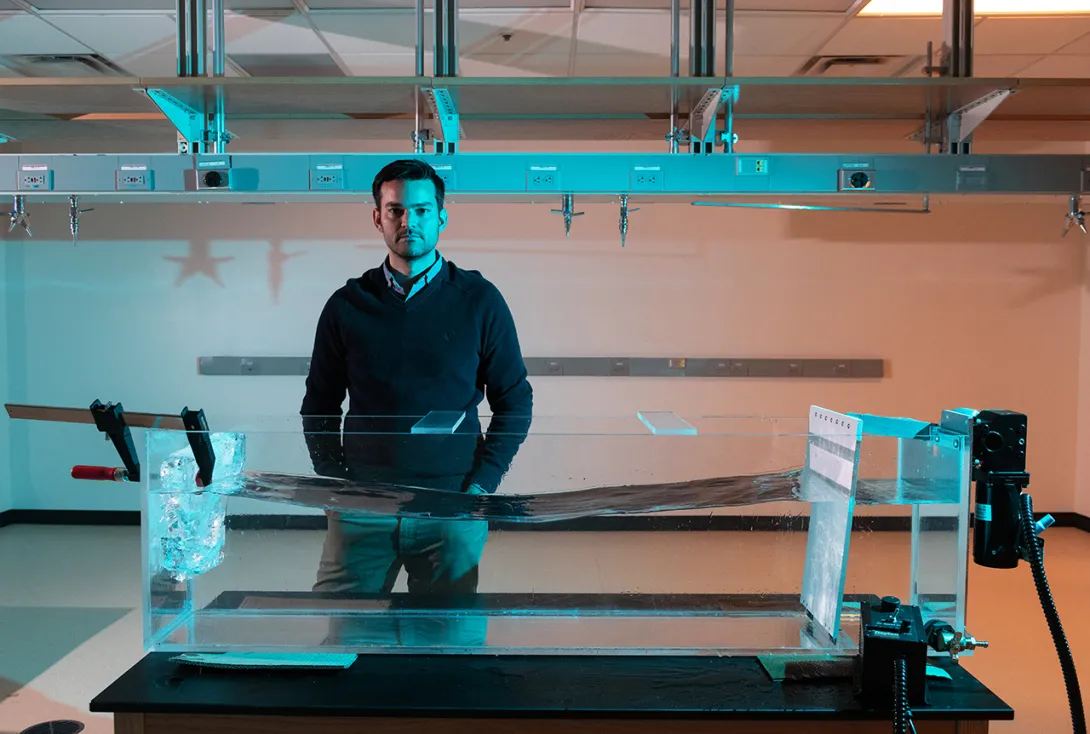Sep. 21, 2023
Dan Caudle (IE ‘12) deeply respects beer's ancient history. It's among humanity's earliest and dearest creations. Some scholars link it to the rise of civilization, saying it boosted progress and innovation alongside bread.
Guiding the creative reins at Mutation Brewing Company, Caudle stands as the head brewer, steering the ship of innovation in the realm of craft beer. He is determined to craft unique, high-quality brews that pay homage to the past while embracing the present.
With each brew concocted under Caudle’s expertise, Mutation Brewing Company becomes a living tribute to the ancient art of brewing. Through Dan's hands, the echoes of time blend seamlessly with modern techniques, resulting in beers that not only tantalize the taste buds but also carry the essence of tradition.
From Classroom to Craft Beers
When selecting his major, Caudle was drawn to the multidisciplinary education offered by Georgia Tech's Industrial and Systems Engineering (ISyE) program. The curriculum covered everything from machine learning to manufacturing, capturing Caudle’s diverse interests.
Caudle discovered the art of homebrewing with his friends and through these hands-on experiences he fell in love with the process of creating unique and flavorful beers. Fondly recalling those brewing sessions, Caudle mentioned, "Every time my friends and I would brew, we would usually name the new beer after the movie we were watching that night."
He really credits his career change to a brewing supply chain project specifically assigned by Damon P. Williams, College of Engineering’s first associate dean for inclusive excellence and chief diversity officer.
“Before that class, I didn’t recognize brewing as an option. It didn’t seem like an obvious path forward with the degree that I chose... I feel like I got insight [at Tech] about the importance of experiencing internships and co-ops, to get a foot in the door at the beginning of my career.”
After Caudle graduated, he worked in manufacturing consulting. However, he always felt like something was missing. He attended The American Brewers Guild in 2016 which included an internship that led to his first job in the brewing industry.
Caudle's profession in craft beer took a significant leap when he became Head Brewer at Mutation Brewing Company in September 2021. Overcoming construction delays and supply chain obstacles, he played an instrumental role in shaping the brewery's vision. "I got to implement process improvements that no one else knew, and I was able to prove to myself that I do know what I am talking about.”
Brewing Love
Georgia Tech not only shaped Caudle's career but also left a lasting mark on his love story. In the midst of a GT football game, unknowingly Caudle met his future wife, Merry Hunter Caudle (Public Policy ‘13, MBA ‘21), through some mutual friends.
They didn’t meet when they were students, but after graduation. They hit it off and started going on beer tours and other GT Athletic events together. Eventually, Caudle decided that the campus had such an intrinsic part of their lives he wanted to propose at Tech Tower.
The two celebrated their engagement by driving around in the classic Ramblin’ Reck. Naturally, they exchanged vows at the Academy of Medicine.
Today, Merry Hunter contributes to Georgia Tech's economic development in the Office of Institute Relations, as the Associate Director. With their home adorned in Tech colors and sports games on their calendar, they truly embody the spirit of a proud yellow jacket couple.
Crafting the Unknown
Looking to the future, Caudle’s passion extends beyond the brew kettle, as he continuously seeks to evolve and adapt in the dynamic craft beer industry.
His dedication to continuous improvement includes listening to industry podcasts, exploring generative AI for efficient practices, and pursuing a certification to become a cicerone, which is akin to a sommelier for beer.
While he knows about the art of creating beer, as a cicerone he will be working to acquire knowledge in five areas: keeping and serving beer, beer styles, beer flavor and evaluation, beer ingredients and brewing processes, and lastly pairing beer with food.
With each sip of his creations, we're reminded of the extraordinary possibilities that arise when passion, education, and innovation mutate together in a pint of finely
News Contact
Nat M. Esparza, Communications Officer II
Sep. 20, 2023
Daan Rutten, a Ph.D. student in Operations Research at the H. Milton Stewart School of Industrial and Systems Engineering, was selected as a finalist in the Nicholson Student Paper Competition.
The George Nicholson Committee Competition is held each year to identify and honor outstanding papers in the field of operations research and management sciences written by a student. This year they received a record number of 139 submissions and only six were selected as finalists.
All finalists are invited to present their papers in the Nicholson Student Paper special sessions at the INFORMS Annual Meeting in Phoenix, AZ. The winner(s) will be announced at the Awards Ceremony at the Annual Meeting.
The paper, “Mean-field Analysis for Load Balancing on Spatial Graphs,” solves a long-standing open problem in load balancing, which dates back to the 90s. The paper introduces a novel approach to establish a mean-field approximation for systems which have data locality constraints between tasks and servers. The paper extends the applicability of mean-field analysis far beyond traditional assumptions.
Daan received his B.S. in Applied Physics and Applied Mathematics and his M.S. in Computer Science and Applied Mathematics from Eindhoven, University of Technology. His Ph.D. research focuses on the performance of large-scale systems and the optimization thereof by incorporating machine learning algorithms and making smart design decisions.
His previous work has studied how to structure cloud networks in the presence of task-server constraints, how to implement machine learning predictions while maintaining robustness and how to learn optimal decision policies in dynamic environments. He is a recipient of the Stewart Fellowship, the ARC-TRIAD Fellowship, a finalist for the Alice and John Jarvis Ph.D. Student Research Award and the INFORMS Junior Faculty Paper Award and has been awarded the ACM SIGMETRICS Best Paper Award.
News Contact
Nat M. Esparza, Communications Officer II
Sep. 19, 2023
In front of a standing-room-only crowd inside the John Lewis Student Center's Atlantic Theater, global leaders from the Hyundai Motor Group and Georgia Tech signed a memorandum of understanding, creating a transformative partnership focused on sustainable mobility, the hydrogen economy, and workforce development.
As the automaker continues to construct its Metaplant America site in Bryan County — the cornerstone of Hyundai's $12 billion investment into electric vehicles and battery production across the state of Georgia — today's signing ceremony symbolizes the vision that Hyundai and Georgia Tech share on the road to advancing technology and improving the human condition.
"As a leading public technological research university, we believe we have the opportunity and the responsibility to serve society, and that technology and the science and policy that support it must change our world for the better. These are responsibilities and challenges that we boldly accept. And we know we can't get there alone. On the contrary, we need travel partners, like-minded innovators, and partners with whom we can go farther, and today's partnership with Hyundai is a perfect example of what that means," Georgia Tech President Ángel Cabrera said.
The state of Georgia and the Institute have positioned themselves as leaders in the electrification of the automotive industry. Hyundai is among the top sellers of electric vehicles in the United States as the company aims to produce up to 500,000 vehicles annually at the $7 billion Savannah plant when production begins in 2025. The plant will create 8,500 jobs, and the company's total investments are projected to inject tens of billions of dollars into the state economy while spurring the creation of up to 40,000 jobs.
"It's clear, we are in the right place with the right partners," Jay Chang, president and CEO of Hyundai Motor Company, said. "When our executive chairman first decided on [the site of] the metaplant, one of the first things he said was, 'Make sure we collaborate with Georgia Tech.’ Hyundai and Georgia Tech have a lot in common. We have proud histories. We celebrate excellence, and we have very high standards. What we love about Georgia Tech is the vision to be a leading research university that addresses global challenges and develops exceptional leaders from all backgrounds."
Spearheading new opportunities for students, the partnership will create technical training and leadership development programming for Hyundai employees and initiate engagement activities to stimulate interest in STEM degrees among students.
José Muñoz, president and global COO of Hyundai Motor Company and president and CEO of Hyundai and Genesis Motor North America, says the company quickly realized the potential impact of the newly forged partnership with Georgia Tech.
"Proximity to institutions like Georgia Tech was one of the many reasons Hyundai selected Georgia for our new EV manufacturing facility. Imagine zero-emissions, hydrogen-powered vehicles here on campus, advanced air mobility shuttling people to Hartsfield-Jackson Atlanta International Airport, or riding hands-free and stress-free in autonomous vehicles during rush hour on I-75 and I-85. Together, Georgia Tech and Hyundai have the resources to fundamentally improve how people and goods move," he said.
In pursuit of sustainability, Hyundai has invested heavily in the potential of hydrogen and plans to lean on the Institute's expertise to explore the potential of the alternative fuel source, primarily for commercial vehicles. Hyundai has deployed its hydrogen-powered XCIENT rigs to transport materials in five countries.
University System of Georgia Chancellor Sonny Perdue was on hand for Tuesday’s ceremony. Reflecting on his visits to the company's global headquarters in South Korea prior to the construction of the West Point, Georgia, Kia plant, he praised the company's values and world-class engineering ability.
"This is a relationship built on mutual trust and respect. It's a company, a family atmosphere, and a culture that I respect and admire for the way they do business and honor progress, innovation, and creativity. That is why I am so excited about this partnership between the Hyundai Motor Group and the Georgia Institute of Technology because that will only enhance that," Perdue said.
Owned by Hyundai, Kia recently invested an additional $200 million into its West Point facility to prepare for the production of the all-electric 2024 EV9 SUV. The plant currently manufactures more than 40% of all Kia models sold in the U.S.
The partnership also includes field-naming recognition at Bobby Dodd Stadium, which is now known as Bobby Dodd Stadium at Hyundai Field, and provides student-athletes and teams with the resources needed to compete at the highest levels, both athletically and academically.
Sep. 06, 2023
“A stitch in time saves nine,” goes the old saying. For a company in Georgia, that adage became very real when damage to a key piece of machinery threatened its operation. The group helping with the stitch in time was the Georgia Manufacturing Extension Partnership (GaMEP), a program of Georgia Tech's Enterprise Innovation Institute that — for more than 60 years — has been helping small- to medium-sized manufacturers in Georgia stay competitive and grow, boosting economic development across the state.
Silon US, a Peachtree City manufacturer that designs and produces engineered compounds used to create a wide range of products — from automotive applications to building materials, such as PEX piping and wire and cable, was experiencing problems with their extrusion line during a time of increasing customer demand. Problems with the drive mechanism on that extrusion line, a piece of equipment critical to the company’s ability to produce, threatened to shut them down. With replacement parts several weeks away, was it safe to continue operating? At what throughput rates? How much collateral damage might be incurred if they continued to operate?
That’s when Silon managers turned to GaMEP for help.
After working through ideas with GaMEP’s manufacturing experts, the team installed wireless condition monitoring sensors that provide continuous, real-time insights on their manufacturing assets’ health. With the sensors, Silon was able to find a sweet spot that not only allowed them to continue operating but also kept them from overexerting the equipment, preventing further damage.
The solution to that problem has now become a routine part of Silon’s process, as company technicians continue to use this sensor technology for early detection of any deviations or anomalies in the machinery’s health, allowing the company’s maintenance team to proactively respond by adjusting scheduled maintenance to avoid costly downtime.
GaMEP’s Sean Madhavaraman says, “Silon is more productive than ever and on track for growth. The strong results in this challenge are a great example of the decades-long focus of GaMEP to educate and train managers and employees in best practices, to develop and implement the latest technology, and to work together with businesses to find solutions.”
Daniel Raubenheimer and Matt Gammon, Silon’s general managers, also lauded GaMEP, saying, “GaMEP’s extensive experience within the manufacturing realm has been a great benefit to our company. The wireless condition monitoring sensors allow us to predict future breakdowns and mitigate a potential catastrophe — allowing us to operate in a safe manner, while saving money, time, and effort.”
News Contact
Blair Meeks
Institute Communications
Aug. 24, 2023
CREATE-X’s Startup Launch will introduce its 10th cohort of talented startup founders on Demo Day, Aug. 31, 5 – 7p.m., in the Exhibition Hall. Last year, the event drew more than 1,500 people, including business and community leaders, to view new products from a wide range of industries. All of the startups are developed through the creative work of Georgia Tech’s faculty, alumni, and students. With these products, CREATE-X founders aim to address global problems head-on with the latest technology and ingenuity.
At the event, attendees will be able to explore the products of over 100 newly minted startups, from consumer apps to deep tech, and engage with more than 250 founders about their entrepreneurial journeys. In 2021, CREATE-X startups were at the frontier of the current AI revolution, integrating OpenAI's GPT-3 well ahead of mainstream adoption.
CREATE-X began in 2014 as a Georgia Tech initiative to instill entrepreneurial confidence in students launching real startups. Their signature program is the 12-week Startup Launch accelerator, in which students and alumni intern for their own companies. Participants attend sessions, team socials, and pitch practices and receive coaching and mentorship from experienced entrepreneurs and notable Tech alumni. Demo Day is the finale of the program, a vibrant exhibition that is free and open to the public.
The inaugural cohort had eight teams. Several companies among the first six cohorts are valued above $100 million, and one company is valued at $1.3 billion. The program has worked with nearly 450 startup teams, with a total portfolio valuation of over $1.9 billion, and has produced more than 1,100 founders launching startups. In the future, CREATE-X Director Rahul Saxena said the program hopes to produce 300 startups a year.
“CREATE-X has a rich entrepreneurial ecosystem that will support students as they launch real startups. In every cohort, I remind participants that the connections they make in the program will carry after, and that they’re surrounded by talent,” Saxena said. “We want every Georgia Tech student to have this advantage when starting their business.”
He noted, “From consumer apps revolutionizing everyday life to sustainable fashion brands paving the way toward responsible consumption — there's something here for everyone. CREATE-X founders are a testament to tomorrow’s possibilities, and we invite you to see it for yourself.”
Registration is open now for Demo Day 2023. For more information, visit the CREATE-X website.
News Contact
Breanna Durham
Marketing Strategist
Aug. 01, 2023
Santosh Vempala has been named a 2023 Simons Investigator in theoretical computer science by the Simons Foundation.
The Simons Investigator award supports “outstanding theoretical scientists in their most productive years, when they are establishing creative new research directions, providing leadership to the field, and effectively mentoring junior scientists.”
Vempala is the Frederick Storey II Chair of Computing and Distinguished Professor in the School of Computer Science at Georgia Tech, with courtesy appointments in the School of Mathematics and H. Milton Stewart School of Industrial and Systems Engineering.
He will receive $150,000 per year for five years from the award, which could be renewed for another five years. Not constrained to any one project, the funding is meant to empower award recipients to push forward on any foundational challenges to computer science that are related to their interests.
For Vempala, who also serves as Director of the Algorithms, Combinatorics, and Optimization Program at Georgia Tech, these challenges have to do with geometry and randomness.
“Some of the most exciting problems in science are those related to efficient algorithms. Computer science really has uncovered fundamentally new questions but also provided novel perspectives on classical problems in mathematics,” Vempala said. “We are yet to understand extremely basic questions such as how best to solve linear systems and linear programs.”
Read the full story inn the School of Computer Science newsroom.
News Contact
Morgan Usry
Communications Officer
School of Computer Science
College of Computing
Georgia Institute of Technology
Jul. 26, 2023
This feature supports Georgia Tech's presence at the International Conference on Machine Learning, July 23-29 in Honolulu.
Honolulu Highlights | ICML 2023
Students and faculty have been focused and energized in their efforts this week engaging with the international machine learning community at ICML. See some of those efforts, hear from students themselves in our video series, and read about their latest contributions in #AI.
Georgia Tech’s experts and larger research community are invested in a future where artificial intelligence (AI) solutions can benefit individuals and communities across our planet. Meet the machine learning maestros among Georgia Tech’s faculty at the International Conference on Machine Learning — July 23-29, 2023, in Honolulu — and learn about their work. The faculty in the main program are working with partners across many domains and industries to help invent powerful new ways for technology to benefit all our futures.
One of the experts in Honolulu is Wenjing Liao, an assistant professor in the School of Mathematics. In addition to machine learning, Liao's research interests include imaging, signal processing, and high dimensional data analysis.
Learn more about the Georgia Tech contingent at the ICML here. Read more about machine learning research at Georgia Tech here.
News Contact
Renay San Miguel
Communications Officer II/Science Writer
College of Sciences
404-894-5209
Jul. 26, 2023
Graduate students, under the guidance of SCL affiliated faculty member Jianjun Shi, have recently received well-deserved recognition for their accomplishments. The students' research interests revolve around the use of machine learning and data analytics in relation to advanced manufacturing.
Michael Biehler (advisor: Professor Jianjun Shi)
- Mary G. and Joseph Natrella Scholarship, American Statistical Association (ASA) (2023)
- Best Student Paper Award (Winner) Quality Control and Reliability Engineering (QCRE) Division, IISE (2023)
- For the paper: M. Biehler, D. Lin , J. Shi (2023): “DETONATE: Nonlinear Dynamic Evolution Modeling of Time-dependent 3-dimensional Point Cloud Profiles” IISE Transactions
- Best Student Paper Award (Finalist) Data Analytics and Information Systems (DAIS) Division, IISE (2023)
- For the paper: M. Biehler, A. Kulkarni, J. Li, J. Shi (2023+): “MULTI-MODAL: MULTI-fidelity, multi-modality 3D shape modeler:” submitted to IEEE Transactions on Automation Science and Engineering
- Phillip J. and Delores A. Scott Graduate Student Health and Wellness Award, H. Milton Stewart School of Industrial and Systems Engineering, Georgia Tech (2023)
- IHE-LeaD Fellow, Burroughs Wellcome Fund, Interdisciplinary and Health and Environment Leadership Development (2022-2023)
Alina Gorbunova (advisors: Professor Jianjun Shi and Professor Kamran Paynabar)
- NSF Graduate Research Fellowship (2023)
Shancong Mou (advisor: Professor Jianjun Shi)
- Best Track Paper Award (Winner), Quality Control and Reliability Engineering (QCRE) Division, IISE (2023)
- For the paper: Mou, S., Gu, X., Cao, M., Bai, H., Huang, P., Shan, J., Shi, J.*, 2023 “RGI: Robust GAN-Inversion for Generic Pixel-wise Anomaly Detection and Mask-free Image Inpainting”, The International Conference on Learning Representations (ICLR 2023).
- John S.W. Fargher Jr. Scholarship, IISE (2023)
- Angela P. and Reed J. Baker Research Excellence Award, School of ISyE, Georgia Institute of Technology (2023)
Zihan Zhang (advisors: Professor Jianjun Shi and Professor Kamran Paynabar)
- Aerospace and Test Measurement Division Scholarship, ISA (2023)
- ISA Scholarship, ISA (2023)
- Gilbreth Memorial Scholarship, IISE (2023)
- NCORE Student Scholar, National Conference on Race and Ethnicity in Higher Education (2023)
Jul. 25, 2023
Valerie Thomas, Anderson-Interface Chair of Natural Systems and Professor in the H. Milton School of Industrial and Systems Engineering, was recently asked to speak as part of Sustainability Research + Innovation (SRI) Congress 2023. The event was hosted online and at the Panama Convention Center by the National Secretariat of Science, Technology, and Innovation of the Republic of Panama (SENACYT) and the Inter-American Institute for Global Change Research (IAI).
Sustainability Research + Innovation Congress 2023 is the world's largest gathering for the global sustainability community, and for the first time, the event took place in the Latin American and Caribbean Region. SRI unites more than 2000 global sustainability research leaders, government and civil society experts, funders and innovators to inspire action and promote a sustainability transformation. The global and annual event elevates diverse knowledge on sustainability, provides an inspiring platform to share innovative ideas, and creates an inclusive space for collaboration and action. SRI is a joint initiative of Future Earth and the Belmont Forum.
As part of the Fri Jun 30 panel session "Reducing Emissions from Logistics", Thomas discussed "Life-cycle Approaches to Assessing Emissions from Logistics." To help provide the academic perspective, she was joined by Marilyn Brown, Regents' and Brook Byers Professor of Sustainable Systems in the School of Public Policy, who spoke on "Three trends challenging U.S. and global emissions reductions from logistics." The private sector perspective was provided by Alex Rodriguez, Regional Head of Energy Transition Execution - LAM with A.P. Moller - Maersk. Rodriquez provided a broad and interesting discussion of air-water-land logistics, its impact on the environment, and possible future solutions. The session was organized by Jorge Barnett Lawton, Managing Director of the Georgia Tech Panama Logistics Innovation & Research Center, who also moderated the session from Panama City.
To learn more about the annual event and view available recordings, please visit https://sricongress.org/.
Jun. 28, 2023
Alex Robel is improving how computer models of melting ice sheets incorporate data from field expeditions and satellites by creating a new open-access software package — complete with state-of-the-art tools and paired with ice sheet models that anyone can use, even on a laptop or home computer.
Improving these models is critical: while melting ice sheets and glaciers are top contributors to sea level rise, there are still large uncertainties in sea level projections at 2100 and beyond.
“Part of the problem is that the way that many models have been coded in the past has not been conducive to using these kinds of tools,” Robel, an assistant professor in the School of Earth and Atmospheric Sciences, explains. “It's just very labor-intensive to set up these data assimilation tools — it usually involves someone refactoring the code over several years.”
“Our goal is to provide a tool that anyone in the field can use very easily without a lot of labor at the front end,” Robel says. “This project is really focused around developing the computational tools to make it easier for people who use ice sheet models to incorporate or inform them with the widest possible range of measurements from the ground, aircraft and satellites.”
Now, a $780,000 NSF CAREER grant will help him to do so.
The National Science Foundation Faculty Early Career Development Award is a five-year funding mechanism designed to help promising researchers establish a personal foundation for a lifetime of leadership in their field. Known as CAREER awards, the grants are NSF’s most prestigious funding for untenured assistant professors.
“Ultimately,” Robel says, “this project will empower more people in the community to use these models and to use these models together with the observations that they're taking.”
Ice sheets remember
“Largely, what models do right now is they look at one point in time, and they try their best — at that one point in time — to get the model to match some types of observations as closely as possible,” Robel explains. “From there, they let the computer model simulate what it thinks that ice sheet will do in the future.”
In doing so, the models often assume that the ice sheet starts in a state of balance, and that it is neither gaining nor losing ice at the start of the simulation. The problem with this approach is that ice sheets dynamically change, responding to past events — even ones that have happened centuries ago. “We know from models and from decades of theory that the natural response time scale of thick ice sheets is hundreds to thousands of years,” Robel adds.
By informing models with historical records, observations, and measurements, Robel hopes to improve their accuracy. “We have observations being made by satellites, aircraft, and field expeditions,” says Robel. “We also have historical accounts, and can go even further back in time by looking at geological observations or ice cores. These can tell us about the long history of ice sheets and how they've changed over hundreds or thousands of years.”
Robel’s team plans to use a set of techniques called data assimilation to adjust, or ‘nudge’, models. “These data assimilation techniques have been around for a really long time,” Robel explains. “For example, they’re critical to weather forecasting: every weather forecast that you see on your phone was ultimately the product of a weather model that used data assimilation to take many observations and apply them to a model simulation.”
“The next part of the project is going to be incorporating this data assimilation capability into a cloud-based computational ice sheet model,” Robel says. “We are planning to build an open source software package in Python that can use this sort of data assimilation method with any kind of ice sheet model.”
Robel hopes it will expand accessibility. “Currently, it's very labor-intensive to set up these data assimilation tools, and while groups have done it, it usually involves someone re-coding and refactoring the code over several years.”
Building software for accessibility
Robel’s team will then apply their software package to a widely used model, which now has an online, browser-based version. “The reason why that is particularly useful is because the place where this model is running is also one of the largest community repositories for data in our field,” Robel says.
Called Ghub, this relatively new repository is designed to be a community-wide place for sharing data on glaciers and ice sheets. “Since this is also a place where the model is living, by adding this capability to this cloud-based model, we'll be able to directly use the data that's already living in the same place that the model is,” Robel explains.
Users won’t need to download data, or have a high-speed computer to access and use the data or model. Researchers collecting data will be able to upload their data to the repository, and immediately see the impact of their observations on future ice sheet melt simulations. Field researchers could use the model to optimize their long-term research plans by seeing where collecting new data might be most critical for refining predictions.
“We really think that it is critical for everyone who's doing modeling of ice sheets to be doing this transient data simulation to make sure that our simulations across the field are all doing the best possible job to reproduce and match observations,” Robel says. While in the past, the time and labor involved in setting up the tools has been a barrier, “developing this particular tool will allow us to bring transient data assimilation to essentially the whole field.”
Bringing Real Data to Georgia’s K-12 Classrooms
The broad applications and user-base expands beyond the scientific community, and Robel is already developing a K-12 curriculum on sea level rise, in partnership with Georgia Tech CEISMC Researcher Jayma Koval. “The students analyze data from real tide gauges and use them to learn about statistics, while also learning about sea level rise using real data,” he explains.
Because the curriculum matches with state standards, teachers can download the curriculum, which is available for free online in partnership with the Southeast Coastal Ocean Observing Regional Association (SECOORA), and incorporate it into their preexisting lesson plans. “We worked with SECOORA to pilot a middle school curriculum in Atlanta and Savannah, and one of the things that we saw was that there are a lot of teachers outside of middle school who are requesting and downloading the curriculum because they want to teach their students about sea level rise, in particular in coastal areas,” Robel adds.
In Georgia, there is a data science class that exists in many high schools that is part of the computer science standards for the state. “Now, we are partnering with a high school teacher to develop a second standards-aligned curriculum that is meant to be taught ideally in a data science class, computer class or statistics class,” Robel says. “It can be taught as a module within that class and it will be the more advanced version of the middle school sea level curriculum.”
The curriculum will guide students through using data analysis tools and coding in order to analyze real sea level data sets, while learning the science behind what causes variations and sea level, what causes sea level rise, and how to predict sea level changes.
“That gets students to think about computational modeling and how computational modeling is an important part of their lives, whether it's to get a weather forecast or play a computer game,” Robel adds. “Our goal is to get students to imagine how all these things are combined, while thinking about the way that we project future sea level rise.”
